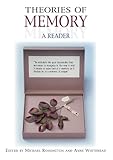Theories of Memory : A Reader / Michael Rossington, Anne Whitehead.
Material type: TextPublisher: Edinburgh : Edinburgh University Press, [2022]Copyright date: ©2007Description: 1 online resource (328 p.)Content type:
TextPublisher: Edinburgh : Edinburgh University Press, [2022]Copyright date: ©2007Description: 1 online resource (328 p.)Content type: - 9780748625024
- 9781474472197
- 153.12 22
- online - DeGruyter
| Item type | Current library | Call number | URL | Status | Notes | Barcode | |
|---|---|---|---|---|---|---|---|
 eBook
eBook
|
Biblioteca "Angelicum" Pont. Univ. S.Tommaso d'Aquino Nuvola online | online - DeGruyter (Browse shelf(Opens below)) | Online access | Not for loan (Accesso limitato) | Accesso per gli utenti autorizzati / Access for authorized users | (dgr)9781474472197 |
Frontmatter -- CONTENTS -- Preface -- Acknowledgements -- List of Illustrations -- Introduction -- Contributors -- Part I: Beginnings -- 1. Classical and Early Modern Ideas of Memory -- 2. Enlightenment and Romantic Memory -- 3. Memory and Late Modernity -- Part II: Positionings -- 4. Collective Memory -- 5. Jewish Memory Discourse -- 6. Trauma -- Part III: Identities -- 7. Gender -- 8. Race/Nation -- 9. Diaspora -- Biographical Details of Editors and Contributing Editors -- Index
restricted access online access with authorization star
http://purl.org/coar/access_right/c_16ec
Theories of Memory provides a comprehensive introduction to the rapidly expanding field of memory studies. It is a resource through which students will be able both to broaden their knowledge of contemporary theoretical perspectives and trace the development of ideas about memory from the classical period to the present.The Reader is organised into three parts:Part I, Beginnings, is historical in scope. Its three sections, Classical and Early Modern Ideas of Memory; Enlightenment and Romantic Memory, and Memory and Late Modernity lay out the key psychological, rhetorical, and cultural concepts of memory in the work of a range of thinkers from Plato to Walter Benjamin.Part II, Positionings, identifies three major perspectives through which memory has been defined and debated more recently: Collective Memory; Jewish Memory Discourse; and Trauma.Part III, Identities, examines the key role of memory in contemporary constructions of identity under the headings Gender; Race/Nation; and Diaspora.The general introduction sets out the significance of the field of memory studies while the accessible introductions to the nine sections also include suggestions for further reading in the area.Key FeaturesOffers a comprehensive introduction to the rapidly expanding field of memory studiesBoth theorizes and historicizes the concept of memory for students of literature and cultureForegrounds the importance of memory in contemporary theoryProvides a thorough survey of theories of memory from the classical period to the presentEdited by a team with a distinct range of expertise as well as experience of teaching theories of memory to graduate students
Mode of access: Internet via World Wide Web.
In English.
Description based on online resource; title from PDF title page (publisher's Web site, viewed 29. Jun 2022)


